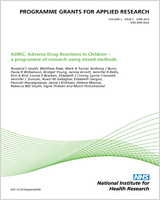Included under terms of UK Non-commercial Government License.
NCBI Bookshelf. A service of the National Library of Medicine, National Institutes of Health.
Iliffe S, Wilcock J, Drennan V, et al. Changing practice in dementia care in the community: developing and testing evidence-based interventions, from timely diagnosis to end of life (EVIDEM). Southampton (UK): NIHR Journals Library; 2015 Apr. (Programme Grants for Applied Research, No. 3.3.)

Changing practice in dementia care in the community: developing and testing evidence-based interventions, from timely diagnosis to end of life (EVIDEM).
Show detailsInformation for care home staff
We are really pleased that you are joining with us in Phase 2 of the EVIDEM project and excited about working with yourselves and the Primary Health Care Team.
What we want to do in January
Our aim is to help you use your experiences and knowledge of what works well to create shared interventions to support and enhance practice. We all want the care of people dying with dementia to be as good as it can possibly be.
What we have asked you to do
We have asked you to tell stories of times when you felt you and the team have delivered care that allowed a resident with dementia to die really well. Although you may have remembered a difficult experience was there a moment when you remembered something good that came out of it? Perhaps you felt proud about how you or your care home handled the difficulty? We are not denying that there are lots of challenges in your work but we are interested in your capacity with your colleagues to overcome these.
The idea of talking about the good things with other colleagues we call Good Gossip because:
- Good Gossip not only makes you feel better, but also your listener and the organisation in which you are working.
- You can only gossip by talking to others, no one gossips on their own.
- Good Gossip is ongoing conversation when you talk and listen to colleagues in your organisation, about what you are proud of, what you do well, what you have seen others do that makes you feel good.
What we want you to do now . . .
Experience and Practice Good Gossip . . . For many of us we need others to help us practice and talk about what we do well. Here are some ways to do that:
- Think about your wishes for your care home and residents dying of dementia, what you would love to see happening or in place . . .
- Go tell someone else and ask them to tell you their wishes. If that feels hard then what would things look like if it were a little better in your care home?
- What would be the smallest thing you could do to bring your wishes into being . . . it may start with saying good morning to someone or learning someone’s name.
- Chapter 4: Intervention information – care home staff - Changing practice in dem...Chapter 4: Intervention information – care home staff - Changing practice in dementia care in the community: developing and testing evidence-based interventions, from timely diagnosis to end of life (EVIDEM)
Your browsing activity is empty.
Activity recording is turned off.
See more...